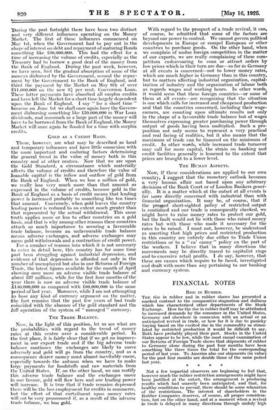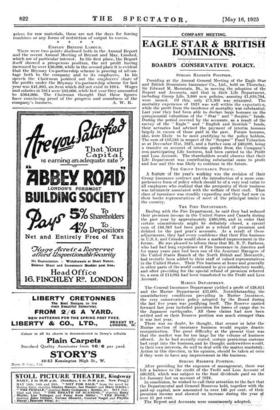FINANCIAL NOTES
RISE IN RUBBER.
TRE rise in rubber and in rubber shares has presented a marked contrast to the comparative stagnation and dullness which has characterized other departments of the Stock Exchange. How far the rise in rubber itself may be attributed to increased demands by the consumer in the United States, Germany and elsewhere in connexion with an actual or an anticipated revival in trade, or how far it is due to panicky buying based on the excited rise in the commodity as stimu- lated by restricted production it would be difficult to say. Both have probably played their part. Stocks in the United States appear to be low, while the most casual examination of our Returns of Foreign Trade shows that shipments of rubber to Germany alone during the past four months have been something like three times the total for the corresponding period of last year. To America also our shipments (in value) for the past four months are double those of the same period last year.
Not a few impartial observers are beginning to feel that, however much the rubber restriction arrangements might have been justified at the outset, the arrangement is producing results which had scarcely been anticipated, and that, for healthy conditions to prevail, there should be some relaxation of the restrictions. The interest of shareholders in the Rubber Companies deserves, of course, all proper considera- tion, but on the other hand, and at a moment when a revival in 'trade' is delayed in many directions through unduly high prices for raw materials, these are not the days for forcing combines or any forms of restriction of output to excess. * C. * *
EMPLOY BRITISH LABOUR.
There were two points disclosed both in the Annual-Report and the recent Annual Meeting of Bryant and May, Limited, which are of particular interest. In the first place, the Report itself showed a prosperous position, the net profit having increased by over £50,000, while in the second place it is evident that the Brymay Co-partnership scheme is proving of advan- tage both to the company and to its employees. In his speech the Chairman pointed out the employees' share of the profits under the Brymay Co-partnership scheme for last year was £41,895, an item which did not exist in 1914. Wages and salaries in 1914 were £95,000, while last year they amounted to £364,000. The Chairman thought that these figures have convincing proof of the progress and soundness of the











































 Previous page
Previous page